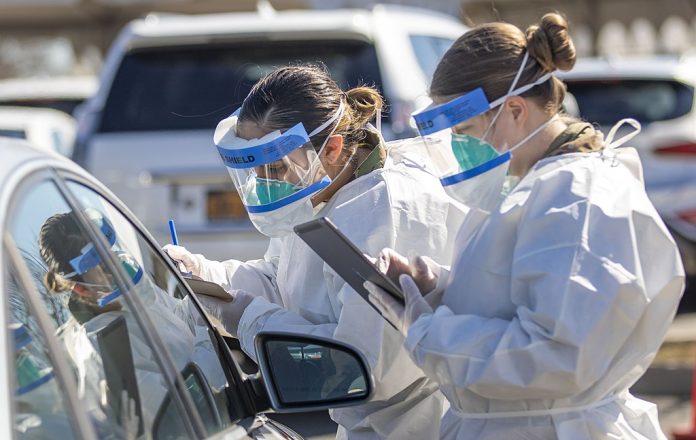No more kisses, handshakes or blowing out birthday candles. But that is alright. We can live with these changes. How people behave in the post-pandemic reality is a different question. There are horses and mules among us. When the rider falls off the horse, the horse usually waits for her to climb back on. The mule, however, might kick or bite the rider.
Twelve years have passed since the 2008 financial meltdown. Millions experienced a drop in their standard of living and endured harsh austerity measures. It is reasonable to expect that the average inhabitant of Uniontown, Pennsylvaniain in the U.S. and Nottingham in the UK will react differently to the “new normal” than the average resident of Atherton, California and Windsor. And the behavior of the typical Greek or Spaniard will not be the same as that of the typical Finn or Dane.
Conspiracy theorists insist on secret Orwellian schemes by a cabal of fabulously wealthy individuals. Apparently, people like Bill Gates want to kill off millions and turn the rest of us into micro chipped serfs in a debt-ridden, neo-feudal world order. Yet if the “Illuminati” have unleashed this virus on the world, they must be a sorry crew of dunces. Even assuming the pandemic kills a lot more people than projected, what do modern-day Johann Adam Weishaupts have to gain from this? History provides no clues. With one third of the population of Europe depleted by the Black Death, the price of labor soared in the 14th and 15th centuries and the value of land and capital plummeted. Workers ate and dressed better, and lords complained the humble turned up their noses at work. Clearly, this state of affairs cannot benefit the world’s puppet masters.
Are we perhaps witnessing a sinister plan to concentrate capital even further? This is happening right now; it always does when companies go bankrupt. Are the world’s “overlords” trying to grab an even greater share of cheap labor? Obviously, the situation created by the pandemic is a great opportunity for companies to cut wages. However, any advantage gained from lowering wages is offset by the tremendous decline in world trade. Despite policies of austerity, quantitative easing, buying securities and keeping interest rates near zero, the volume of world trade was falling long before the Covid-19 crisis appeared.
The dominos are falling predictably. Europe and North America will continue to consume less and China will not produce as much. In turn, countries like Brazil, Argentina, Australia and Canada will export fewer raw materials to China. It is easy to see how trade barriers may lead to more trade wars. This all spells Great Depression 2.0.
Yet we appear to be lucky in our misfortune. These are not the 1930s. The West is not preparing to “self-cannibalize” in a great war again. A major blow to the global economy will not lead to WWIII because nuclear weapons make total war utterly insane and thus highly improbable. Not to mention that post-modern wars no longer solve economic crises as they are far more expensive.
We have crossed the Rubicon. How can the EU, China, Russia and the U.S. return to the status quo ante in terms of military expenditure? With the exception of some regional powers like Turkey and Iran, which country’s citizens will now acquiesce to spending astronomical sums on military might? Covid-19 is a powerful one-two punch to both the planet’s military-industrial complexes and the very urge to conduct politics by “other” means.
The crisis is also a huge damper on Chinese economic expansion, both at home and abroad. China’s GDP growth rate is currently below the 6 percentage points experts say leads to social unrest. The Red Giant holds $3 trillion in foreign currency reserves and has some room for maneuver. But what happens when its huge housing market bubble bursts?
Not so long ago, everyone was talking about the imminent arrival of an “Asian Age” or “Asian Century.” The “march” of the East of course started after WWII, when China became the world’s factory. A few weeks ago, just before the Covid-19 lockdown, Asia’s share of world GDP was nearing the 50 percent mark. But this may all end now. By investing in the real economy, the West is in a position to step back onto center stage. Needless to say, the planet would be a better place if East and West cooperated as equal partners in a global economy run according to a sustainable plan we can all agree on.
In the glutted market of the 1970s and 1980s, big capital investors sought profit in the financial sector, real estate bubbles and commodity markets. Will investors in the West take advantage of the falling cost of labor and funnel money into production? Will they reinvent themselves as new Henry Fords, John Rockefellers and Andrew Carnegies? In the U.S., will Donald Trump’s 2016 promise to revive the rust belt finally be realized?
Governments will try to use Keynesian strategies to deal with the economic crisis. They will throw money at it, hoping this will work. But their chances of success will turn on whether or not they invest in jobs that grow the economy and improve people’s lives—and this at a very difficult juncture when demand is far greater than supply and the ability to pay.
The lockdown has taught us all the importance of the real economy. If neoliberal capitalists do not act fast, someone else will step into the breach to steer society away from “bubble” capitalism towards a citizen-propelled expansion of the real economy. People working in production and essential services will rise to the occasion. In defending their jobs and asserting themselves at their place of work, they will be helping their families and society at large.
The views and opinions expressed in this article are those of the author.

The author holds a Ph.D. in Russian history from Columbia University. He has taught German and Russian history at universities in the United States, Canada and Russia. His work has appeared in Slavic Review, Russian and East European Review, Journal of Family History, Russian Review, Geist, Threepenny Review, The New Statesman, Dissent and American Motorcyclist, among others.


